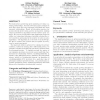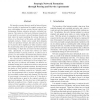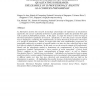453 search results - page 83 / 91 » From Individuals to Social and Vice-versa |
WEBI
2010
Springer
13 years 5 months ago
2010
Springer
In this paper, we propose a methodology to predict the popularity of online contents. More precisely, rather than trying to infer the popularity of a content itself, we infer the l...
WWW
2007
ACM
14 years 8 months ago
2007
ACM
Information flows in a network where individuals influence each other. The diffusion rate captures how efficiently the information can diffuse among the users in the network. We p...
PODS
2009
ACM
14 years 8 months ago
2009
ACM
We study privacy-preserving query answering over data containing relationships. A social network is a prime example of such data, where the nodes represent individuals and edges r...
FOCS
2006
IEEE
14 years 1 months ago
2006
IEEE
We introduce a game theoretic model of network formation in an effort to understand the complex system of business relationships between various Internet entities (e.g., Autonomou...
ECIS
2004
13 years 9 months ago
2004
As Information Systems (IS) research increasingly acknowledges the importance of non-positivist approaches, the case for a plurality of theories to guide qualitative studies has g...



